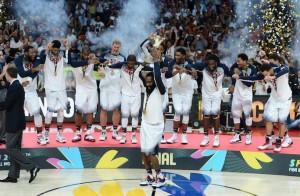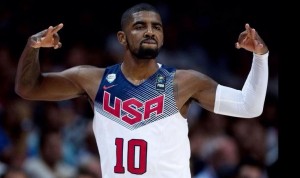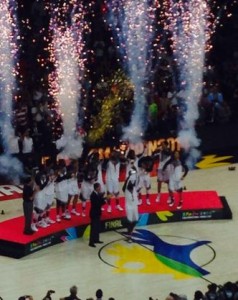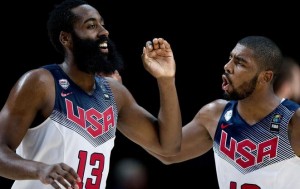
 MADRID — Team USA’s bus was parked in the narrow street outside the Palacio de los Deportes, and a crowd dozens of people deep — folks from Espana, Serbia and America, too — broke into a chant of “M-V-P” for Kyrie Irving as he exited the arena and made his way on board. He heard them, and he let them know that he had heard them.
MADRID — Team USA’s bus was parked in the narrow street outside the Palacio de los Deportes, and a crowd dozens of people deep — folks from Espana, Serbia and America, too — broke into a chant of “M-V-P” for Kyrie Irving as he exited the arena and made his way on board. He heard them, and he let them know that he had heard them.
Kenneth Faried got a lot of love, too, and gave some back with that whiter-than-white smile that became so familiar to anyone who paid close attention to the 2014 FIBA World Cup. He gave a salute, and the crowd saluted back.
You don’t see scenes like this in the NBA, where the team bus is hidden inside the arenas, and where the blacked-out windows block out any interaction with the fans who line up outside hoping but always failing to get a single glimpse of their heroes.
The World Cup is different. And it matters.
And to all those basketball fans back home who did not want to be bothered, or did not pay attention, or said it did not matter — you are wrong. If Irving wins an NBA championship for the Cleveland Cavaliers playing alongside LeBron James and Kevin Love next season, part of the reason he will have been successful is because of what he went through this summer.
“Being a part of it, you’re part of something bigger than yourself,” Irving said. “This is by far the biggest accomplishment of my life so far. This is amazing, one of the greatest feelings that I’ve ever felt. The memories will last a lifetime.”
 Irving knocked down all six of his 3-pointers as the Americans unleashed an offensive onslaught on Serbia in their 129-92 victory. The execution from Team USA was astonishing, even given the caliber of opponent.
Irving knocked down all six of his 3-pointers as the Americans unleashed an offensive onslaught on Serbia in their 129-92 victory. The execution from Team USA was astonishing, even given the caliber of opponent.
Serbia was not the team that was supposed to make it to the final game; that was supposed to be Spain. But the Americans’ lack of familiarity with a team that did not have a single current active NBA player was only a factor for a few minutes.
Four minutes into the first quarter, Anthony Davis had already been whistled for two fouls, and a phantom foul was called against Faried that caused coach Mike Krzyzewski to call timeout and give his best death glare to the referees. The Americans trailed 12-5.
“We made an adjustment. I told them to stop picking them up defensively full court and pick them up at halfcourt, because they were trying to pound it down our throats,” Krzyzewski said. “And that’s when DeMarcus Cousins came in and turned the game around.”
Cousins, whose maturity has been questioned ever since he came into the NBA, was indeed a game-changer with his defense, effort and energy. Once he blocked a couple of shots and deflected a ball for a steal, the Americans got into the open court and were completely unstoppable.
Almost every 3-point attempt splashed through. The 50-50 balls underneath the basket almost all ended up in American hands. The execution was exquisite, the basketball was beautiful, and the game was soon a rout. Thirty-five points in the first quarter. Thirty-seven more in the second quarter.; a 30-point lead early in the third quarter that quickly reached 40.
 It was just an astonishing display of talent from a team that did not have many of the big names that had populated so many recent U.S. national teams. But it was a team of stars nonetheless, and it was a team that could beat you with a number of players — Irving, James Harden, Faried, Klay Thompson, Stephen Curry, Davis, Cousins. They were dominant in every sense of the word, the first U.S. team to win all of its games at a World Championship by at least 20 points and the first team in history to make it four straight victories at major international tournaments, the 2008 and 2012 Olympics along with the 2010 World Championship and the newly renamed World Cup.
It was just an astonishing display of talent from a team that did not have many of the big names that had populated so many recent U.S. national teams. But it was a team of stars nonetheless, and it was a team that could beat you with a number of players — Irving, James Harden, Faried, Klay Thompson, Stephen Curry, Davis, Cousins. They were dominant in every sense of the word, the first U.S. team to win all of its games at a World Championship by at least 20 points and the first team in history to make it four straight victories at major international tournaments, the 2008 and 2012 Olympics along with the 2010 World Championship and the newly renamed World Cup.
“We had spurts of dominance,” Coach K said. “We had tough games, and then we’d have a spurt and it looked like we dominated. Tonight we had a 35-minute spurt.”
Such a long way Coach K has come since he first took this job. Back in 2006 when he was on his first tour with Team USA, he referred to opposing players by their numbers rather than their names, infuriating federations from around the world as well as FIBA.
When Marco Belinelli had a strong game for Italy against the U.S. team during pool play in Saitama, Japan, during the 2006 worlds, Krzyzewski spoke about wanting to recruit him to play for Duke. Clearly, he had no idea that Belinelli was already a professional.
But that was eons ago, as are the memories of the American’ last loss in an international competition in the 2006 semifinals against Greece. Every single top American player now has at least one gold medal to prove just how far the program has come, and Krzyzewski — after being humbled — has learned how to represent his country with genuine class. Lots of folks back home don’t like him. Lots of folks at home should appreciate how much he has grown.
Just take a look at the players he did not have in this tournament after expecting back in June to have all of them: Kevin Durant, Kevin Love, Russell Westbrook, Kawhi Leonard, LaMarcus Aldridge.
And of course, Paul George, who got a phone call from Krzyzewski in the locker room after the game as he continues to recuperate from the broken leg he suffered at the end of training camp. If anyone had told Coach K back in June that Faried would be his most reliable big man, he’d have recommended an excellent anti-doping program.
“We had a different star each game. It was not like there was one star, it was a championship team. It was kind of cool. This was a heck of a team, a really good team,” Krzyzewski said.
“It was about throwing your heart into it,” Irving said.
 Experiences like this help build NBA champions, but until young American players go through the experience and plant their feet on the ground overseas, they never quite have a true appreciation of how rewarding an experience it can be. Irving will surely recollect the time he was walking near the beach in Barcelona during the early stages of the knockout round and was going unnoticed by everyone around him. A Canadian journalist saw him and walked up to say hello, remarking on how incredible it was that a major American basketball star could be so anonymous in this day and age in our shrunken world.
Experiences like this help build NBA champions, but until young American players go through the experience and plant their feet on the ground overseas, they never quite have a true appreciation of how rewarding an experience it can be. Irving will surely recollect the time he was walking near the beach in Barcelona during the early stages of the knockout round and was going unnoticed by everyone around him. A Canadian journalist saw him and walked up to say hello, remarking on how incredible it was that a major American basketball star could be so anonymous in this day and age in our shrunken world.
“Shhhh,” Irving gestured. He was loving it.
As Irving said, the memories from this tournament will last a lifetime. And when a player of his caliber comes to the postgame press conference with his MVP award laid out on the table in front of him and announces it is the greatest moment of his basketball career, it means something.
Something special.
That’s what this team was, and they did all Americans proud with the way they re-asserted American basketball brilliance. If you paid close enough attention, you walked away from this tournament with a new appreciation for the skills of the coach and the players, and how special it is for players to wear the red, white and blue and to beat everyone up like they were the original Dream Team. Bravo to them.
Chris Sheridan is publisher and editor-in-chief of SheridanHoops.com. He has covered every senior U.S. men’s national team since the 1996 Olympics. Follow him on Twitter.
I love the World Championship for exactly the reasons, the US showed. We take new faces, unheralded (more or less) players and we show the world what’s great about our game: freedom, skill, creativity, and belief. Kudos to the coaches for letting these men play their own offensive game, because they know how better than any coach can do on a chalk board. Defense on the other hand is where coaches matter and ours did a great job there showing their superiority.
The World Championship is now where you see US Basketball at it’s best.